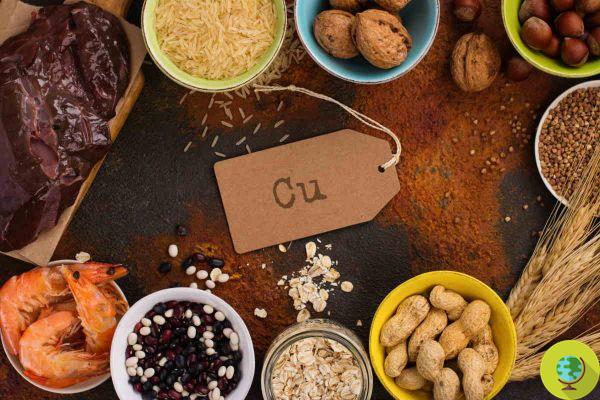
Copper is an essential mineral for many functions in our body. Let's see what happens when a deficiency develops and what are the best food sources to get more
Don't store avocado like this: it's dangerous
Often when we talk about deficiencies we tend to think immediately of iron, but in reality both in our body, in the jewels we wear and in the pots we use in the kitchen there is an element that is as present as it is important: we are talking about copper, a mineral of great importance which we have found to be increasingly lacking over the years.
According to a recent study, in fact, copper in the Western diet has been on the decline since at least the 30s: half of the adult population consumes less copper than recommended by European guidelines, while at least a quarter of American adults are deficient.
Copper helps to keep the immune system strong and increases energy levels, promoting good health of our cardiovascular system, and it is therefore essential to take it in the right amount in order not to risk serious damage.
- Read also: Excessive Copper Levels: Causes, Symptoms and Remedies)
Let's see together what happens to the body when a copper deficiency develops and what are the sources for getting more copper.
Index
What happens if we don't get enough copper?
Copper is an essential nutrient for our body and plays an important role in many bodily functions, promotes the production of Red blood cells, helps keep nerve cells healthy and strengthens the immune system by increasing the number of white blood cells that help prevent infections.
Furthermore, copper is one of the three essential trace elements and is part of the 16 enzymes currently known and is used to reabsorb iron, helping with the development and maintenance of healthy blood vessels and connective tissues, which is why taking it in the right amount is important, if we do not want to run into cardiovascular disease or in the risky increase in blood pressure and cholesterol level.
Copper helps preventosteoporosis increasing bone mineral density, promoting collagen production and fighting inflammation by acting as an antioxidant in the body, further reducing the risk of chronic disease.
Il copper promotes the absorption of iron through diet, consequently a copper deficiency is often associated with an iron deficiency. Both trace elements are essential for the production of red blood cells. Iron deficiency tends to manifest itself through anemia and a lack of pigmenting substances, which in turn cause skin pigmentation problems and premature and sudden graying of the hair. Anemia also manifests itself through exhaustion, fatigue, concentration problems and general body malaise.
How Much Copper Should We Consume Each Day?
Given the benefits associated with copper and concerns about insufficient intake, getting the right daily dose of this mineral is vital. Like other minerals, the adequate amount of copper needed for our health varies from person to person, based on life stages and age. The amount of copper to be taken, in fact, increases with increasing age and the more we grow, the greater the need, especially for women during the delicate phase of pregnancy and breastfeeding. In particular:
- I children up to one year of age they need 200 mcg per copper day,
- i children from one to eight years should consume between 340 and 440 mcg of copper per day.
- During the'adolescence, copper intake increases from 700 to 890 mcg,
- For the adults you will need to assume approx 900 mcg per day of copper.
- A particular case is that of pregnancy, so women will need approx 1000 mcg of copper per day.
What are the best sources of copper?
Copper is usually taken through thesupply, therefore in the presence of a balanced diet, copper deficiency occurs only rarely.
There are many foods rich in copper that can help keep the body healthy and avoid this deficiency, including:
- Shellfish and crustaceans, such as oysters or lobsters
- Funghi Shiitake
- Whole grains
- Spirulina
- beans
- Nuts and seeds, such as almonds, cashews, and sesame seeds
- Potatoes
- Liver
- Dark leafy vegetables like spinach, kale, and beets
- Dark chocolate
Follow your Telegram | Instagram | Facebook | TikTok | Youtube
Sul copper see also:
- How to cleanse yourself of nickel and heavy metals: 10 foods or detox remedies to try
- Using copper against mosquito larvae: truth or legend?


























